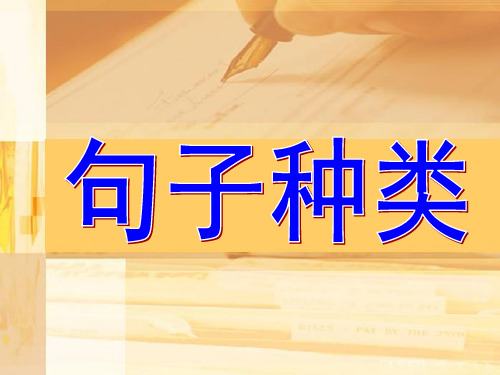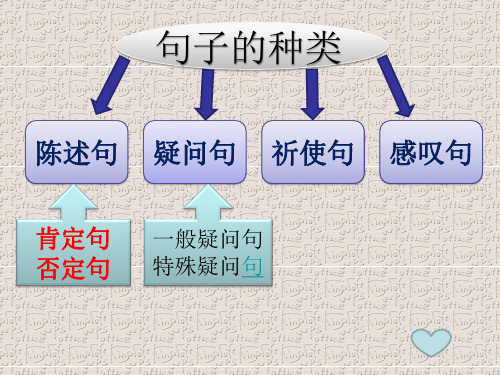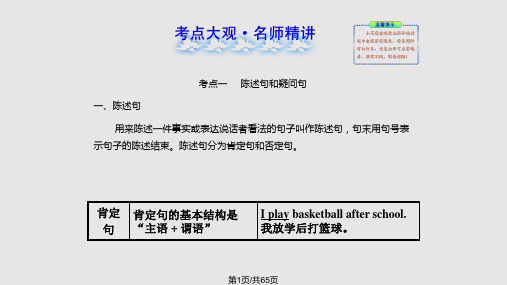初中英语《句子的种类》优秀公开课课件
合集下载
句子种类ppt课件

.
简单句的5种结构
英语句子的基本结构可以归纳成五种基本 句型,掌握这五种基本句型,是掌握各种英语 句子结构的基础。
英语五种基本句型列式如下: 一: S V (主+谓) 二: S V P (主+系+表) 三: S V O (主+谓+宾) 四: S V o O (主+谓+间宾+直宾) 五: S V O C (主+谓+宾+宾补)
.
S │ V (不及物动词)
The sun │was shining.太阳在照耀着。
The moon │rose. 月亮升起了。
The universe │remains. 宇宙长存。
We all │breathe, eat, and drink.
我们大家都呼吸、吃和喝。
Who │cares?
பைடு நூலகம்
管它呢?
The new machine will save you a lot of labour. 7.他用他的第一个月工资给他妈妈买了一件毛衣。
7.He bought a new coat for his mother with his first month’s salary.
.
基本句型 五: S V O C (主+谓+宾+宾补)
7.Jim 还不会自己穿衣服。
Jim cannot dress himself.
8.我们大家都相信Jack 是一个诚实男孩。
All of us believe that Jack is an honest boy.
9. 他不知道说什麽好。
He did not know what to say.
10. 我开窗户你在意吗?
.
巩固练习:
1.昨晚我写了一封信。
I wrote a letter last night.
简单句的5种结构
英语句子的基本结构可以归纳成五种基本 句型,掌握这五种基本句型,是掌握各种英语 句子结构的基础。
英语五种基本句型列式如下: 一: S V (主+谓) 二: S V P (主+系+表) 三: S V O (主+谓+宾) 四: S V o O (主+谓+间宾+直宾) 五: S V O C (主+谓+宾+宾补)
.
S │ V (不及物动词)
The sun │was shining.太阳在照耀着。
The moon │rose. 月亮升起了。
The universe │remains. 宇宙长存。
We all │breathe, eat, and drink.
我们大家都呼吸、吃和喝。
Who │cares?
பைடு நூலகம்
管它呢?
The new machine will save you a lot of labour. 7.他用他的第一个月工资给他妈妈买了一件毛衣。
7.He bought a new coat for his mother with his first month’s salary.
.
基本句型 五: S V O C (主+谓+宾+宾补)
7.Jim 还不会自己穿衣服。
Jim cannot dress himself.
8.我们大家都相信Jack 是一个诚实男孩。
All of us believe that Jack is an honest boy.
9. 他不知道说什麽好。
He did not know what to say.
10. 我开窗户你在意吗?
.
巩固练习:
1.昨晚我写了一封信。
I wrote a letter last night.
句子的种类(英语)PPT

句子按说话目的可分为四种类型: 陈述句、疑问句、祈使句和感叹句。
陈述句 考点:陈述句的肯定结构和否定结构。 陈述句用于陈述一件事或表示一种看 法,它包括肯定结构和否定结构两种。 在肯定结构中,谓语动词不含否定词;否 定结构是在系动词、助动词或情态动词后 加not,除了not外,其他否定词(如:no, hardly,never等)也可以构成否定句。
1. Tom is watching TV now. (改为否定句) isn’t watching Tom ______________ TV now. 2. Wei Hua swims fastest in our group. (改 为否定句) doesn’t swim fastest in our Wei Hua ______________ group.
My favorite color is black. (用white改为选 择疑问句) or _____ Is your favorite color black ______ white?
2. When you get into trouble, will you A give up? keep trying ____ A. or B. and C. but D. so 3. –Bill, does your sister have brown hair or red hair? C - _____ .She takes after my mother.
8. ---Could you tell me _____ it takes to B walk to the post office? ---About 20minutes. A. how far B. how long C. how often D. how soon
陈述句 考点:陈述句的肯定结构和否定结构。 陈述句用于陈述一件事或表示一种看 法,它包括肯定结构和否定结构两种。 在肯定结构中,谓语动词不含否定词;否 定结构是在系动词、助动词或情态动词后 加not,除了not外,其他否定词(如:no, hardly,never等)也可以构成否定句。
1. Tom is watching TV now. (改为否定句) isn’t watching Tom ______________ TV now. 2. Wei Hua swims fastest in our group. (改 为否定句) doesn’t swim fastest in our Wei Hua ______________ group.
My favorite color is black. (用white改为选 择疑问句) or _____ Is your favorite color black ______ white?
2. When you get into trouble, will you A give up? keep trying ____ A. or B. and C. but D. so 3. –Bill, does your sister have brown hair or red hair? C - _____ .She takes after my mother.
8. ---Could you tell me _____ it takes to B walk to the post office? ---About 20minutes. A. how far B. how long C. how often D. how soon
句子的种类(20张PPT)初中英语专项复习课件

他?
(2)特殊疑问句
用特殊疑问词(组)引导的疑问句叫作特殊疑问句,回答时不能使用yes或no,
而是根据实际情况作答。
疑问词(组)
含义及用法
例句
who which what
“谁”,询问身份
“哪一个”,询问特定的人或 物 “什么”,询问职业或身份等
Who is the man under the tree? 树底下的那个男人是谁? Which book do you like?你喜欢 哪一本书? —What is he?他是干什么的? —He's a teacher.他是一名教师。
句子的种类
初中英语专项复习
1.陈述句
构成
谓语动词不含否定词。分为两 肯定 形式 种,一种为正常语序,一种为倒
装语序
例句 ①My parents are both doctors. 我的父 母都是医生。 ②In the center of the city is a big park.这个城市中心有一个大公园。
Tom doesn't like playing the piano. 汤 姆不喜欢弹钢琴。
构成 除not外,使用其他否定词也可构 成否定句,如no,never, 否定 形式 seldom,hardly,nothing, neither,nobody,few,little, nhave never been to Shanghai. 我从 来没有去过上海。 ②None of these pens works/work. 这 些钢笔没有一支能用。
11.(2023吉林改编)—__H_o_w__f_a_r_ is it from our school to the new bookstore, Li Lei? —Only one kilometer. 12.(2023营口改编)—Lingling, _h_o_w___s_o_o_n_ will your brother come back from abroad? —Hmm, in a week. 13.(2023宿迁改编)—China won all the gold medals at the 2023 World Table Tennis Championships. —_W__h_a_t_exciting news!
七年级英语句子的分类(完整版).ppt

根据答语写问句(有的答案可以多样)
1. Yes, I like music very much. 2. No, it isn't. Music is my favorite. 3. My favorite color is green. 4. Because it's fun. 5. My birthday is on February 5th. 6.
2. Tom likes peaches. Does Tom like peaches?
一般疑问句的肯定回答、 否定回答。
Yes,… 代词主格+关键词。
No,…代词主格+关键词 +not.
1.Is she a pupil? Yes, she is.
No, she is not./No, she isn`t. 2.Can you see a star?
据实回答
1. Does your father eat fruit after dinner? 2. Is your birthday before(在...前) July? 3.Where is your math book? 4. What color do you like? 5. Do you have art on Wednesday? 6. Why do you like computer? 7. How much is your pen? 8. What's your favorite day? 9. Who is your history teacher? 10. When is your mother's birthday?
Yes, I can.
No, I can not./No, I can`t.
初三英语总复习_句子的种类PPT课件

13. Ben read the letter again and again. Ben didn’t read the letter again and again.
2020/4/11
10
3 2.疑问句及其回答
( Interrogative Sentence and Answer )
提出询问的句子被称为疑问句。疑问 句主要分为一般疑问句、特殊疑问句、 选择疑问句、反意疑问句。
其否定形式直接用haven’t/ hasn’t/ hadn’t表示。 They have already finished their work. → They haven’t finished their work yet.
2020/4/11
8
Have a try!
Change the following sentences into negative: 1. My father was a teacher in his forties. 2. Tom’s parents will leave for Beijing tomorrow. 3. Jane can sing lots of songs. 4. Betty used to go to work on foot. 5. They were watching TV at that time. 6. I like having a barbecue in hot weather. 7. There are some fish in the river. 8. My grandma lives in Sichuan.
They did not (didn’t) have an English lesson this morning. (此处have不作“有”解而表示动作)
2020/4/11
10
3 2.疑问句及其回答
( Interrogative Sentence and Answer )
提出询问的句子被称为疑问句。疑问 句主要分为一般疑问句、特殊疑问句、 选择疑问句、反意疑问句。
其否定形式直接用haven’t/ hasn’t/ hadn’t表示。 They have already finished their work. → They haven’t finished their work yet.
2020/4/11
8
Have a try!
Change the following sentences into negative: 1. My father was a teacher in his forties. 2. Tom’s parents will leave for Beijing tomorrow. 3. Jane can sing lots of songs. 4. Betty used to go to work on foot. 5. They were watching TV at that time. 6. I like having a barbecue in hot weather. 7. There are some fish in the river. 8. My grandma lives in Sichuan.
They did not (didn’t) have an English lesson this morning. (此处have不作“有”解而表示动作)
句子的种类ppt课件

He is going to be a doctor.---- He isn’t going to be a doctor .(一般将来时)
He is reading a story book.---- He isn’t reading a story book.(现在进行时)
如果句子中的谓语动词为行为动词,变为否定结构时,将 行为动词之前加上否定的助动词,如:
特殊疑问词有: What 对事物提问 Where 对地点提问 When/ What time 对时间提问 Who 对人提问(如果Who作主语,则要用陈述句语序) Whose 对所属提问 How much 对价格提问
How many对数量提问,如How many apples
Hoபைடு நூலகம் old 对年龄提问
一般是指用yes或no回答的疑问句。
基本结构为: 助动词/情态动词+主语+…… 也就是说将 陈述句的第一个助动词(be或will,have,has)或情态动词(can)提 至主语之前;如:
He is a teacher.------------ Is he a teacher?(一般现在时)
He was a worker.----Was he a worker? (一般过去时)
Come in, please.
Don’t come in. Let’s go to school. Let’s not go to school.
4. 感叹句 用以表示喜怒哀乐等强烈感情的句子叫做感叹句,感叹句
句末常用感叹号。 感叹句的构成结构: How+形容词/副词+主语+谓语
例如:
How beautiful (you are)! What+ (a/an)+形容词/副词+名词+谓语(当名词为不可数名 词时,a/an省略)例如:
He is reading a story book.---- He isn’t reading a story book.(现在进行时)
如果句子中的谓语动词为行为动词,变为否定结构时,将 行为动词之前加上否定的助动词,如:
特殊疑问词有: What 对事物提问 Where 对地点提问 When/ What time 对时间提问 Who 对人提问(如果Who作主语,则要用陈述句语序) Whose 对所属提问 How much 对价格提问
How many对数量提问,如How many apples
Hoபைடு நூலகம் old 对年龄提问
一般是指用yes或no回答的疑问句。
基本结构为: 助动词/情态动词+主语+…… 也就是说将 陈述句的第一个助动词(be或will,have,has)或情态动词(can)提 至主语之前;如:
He is a teacher.------------ Is he a teacher?(一般现在时)
He was a worker.----Was he a worker? (一般过去时)
Come in, please.
Don’t come in. Let’s go to school. Let’s not go to school.
4. 感叹句 用以表示喜怒哀乐等强烈感情的句子叫做感叹句,感叹句
句末常用感叹号。 感叹句的构成结构: How+形容词/副词+主语+谓语
例如:
How beautiful (you are)! What+ (a/an)+形容词/副词+名词+谓语(当名词为不可数名 词时,a/an省略)例如:
初中英语句子种类讲解(PPT52张)

newspaper when I
came in. ❖She is the girl who
sings best of all.
定语从 句
❖It is well-known that the 2008 Olympic Games will be held on August 8th.
主语从句
❖As is known to all, the
neither…. nor…. ▪ 转折并列连词: but,while,yet
▪ 因果并列连词: for, so
▪ 选择并列连词: or
请用合适的并列连词把每组句子合
并为一个并列句。 1.He was tired. He went to bed.
He was tired, so he went to bed.
<2>. Do you know what w\as
happened yesterday? (改错)
3. _主__语___+__谓__语__+__宾__语___(_S_+V+O)
We are having an English class.
Mr Wang will attend the lecture.
★高考经常考查的系动词:
<1>. “变得”g_e_t____b,e_c_o__m_e__,
_t_u_r_n___, _g_o_____, _g_r_o_w_...
<2>. “看起来”lo_o__k___s,_e_e_m___,_a_p_p__e_ar “闻起来”s_m__e_ll__ “尝起来”taste
感叹句结构
感叹句通常有what, how引导,表示赞美、惊
英语句子的种类及练习课件

英语句子练习方法与技 巧
句子结构分析方法
句子成分:主语、谓语、宾语、定语、状语、补语等 句子类型:简单句、并列句、复合句等 句子结构分析步骤:找主谓、找连词、找宾语、划分句子成分 句子结构分析技巧:注意连词的作用,识别并列句和复合句,理解句子意思
直译与意译 增译与减译 词性转换 语态转换
丰富内容:增加更多不同类型的英语句子练习,包括口语、写作、阅读等方面,帮助学生全面提 高英语能力。
个性化教学:根据学生的学习情况和需求,设计更加个性化的课件内容和教学方式,满足不同学 生的需求。
技术更新:不断跟进新技术和新媒体的发展,将最新的技术和手段融入到课件中,提高课件的质 量和效果。
感谢您的耐心观看
分类:时间状语从句、地点状语从句、原因状语从句、条件状语从句等
练习方法:通过选择题、填空题、改错题等方式进行练习
注意事项:注意从句的时态、语态和语气等问题,以及与主句的逻辑关系
复合句翻译练习
给出汉语句子,让学生翻译成英语复合句 给出英语复合句,让学生翻译成汉语句子 对比中英文复合句的结构和表达方式,让学生更好地理解两种语言的差异 通过实际练习,提高学生的翻译能力和语言运用能力
并列句
并列句的定义:由两个或两个以上的简单句用并列连词连接起来构成的句子。
并列句的构成:并列连词+简单句
并列句的分类:根据并列连词的不同,可以分为并列关系、转折关系、选择关系和因 果关系等。
并列句的练习方法:通过造句、翻译、改写等方式进行练习,提高对并列句的运用能 力。
复合句
定义:由一个主 句和一个或多个 从句构成的句子
主语+谓语+宾语
定义:主语+谓 语+宾语是构成 简单句的基本结 构
英语句子类型市公开课获奖课件省名师示范课获奖课件

A. Henry hasn’t too B. Henry also has not either C. neither Henry has D. neither has Henry
10. There are many sports lovers in his office. Some love climbing, ____ others enjoy swimming. A. or B. For C. while D. so
2. ---- Your uncle isn’t an engineer, is he? ---- ____.
A. Yes, he isn’t B. No, he isn’t
C. No, he is
D. He is
3. ____ joyful he was to meet his brother again!
• The house is big. • You are students. • Two is the second number.
• 谓语:用来阐明主语做了什么动作或处 于什么状态。谓语一般是动词,放在主 语旳背面。(有时态、人称等变化)
• We come to school five days a week.
句子类型
• 句子种类两种分类法 1、按句子旳用途可分四种: 1)陈说句(肯定、否定):
He is six years old. She didn’t hear of you before. 2)疑问句(一般、特殊、选择、反意): Do they like skating? How old is he? Is he six or seven years old? Mary can swim, can’t she?
10. There are many sports lovers in his office. Some love climbing, ____ others enjoy swimming. A. or B. For C. while D. so
2. ---- Your uncle isn’t an engineer, is he? ---- ____.
A. Yes, he isn’t B. No, he isn’t
C. No, he is
D. He is
3. ____ joyful he was to meet his brother again!
• The house is big. • You are students. • Two is the second number.
• 谓语:用来阐明主语做了什么动作或处 于什么状态。谓语一般是动词,放在主 语旳背面。(有时态、人称等变化)
• We come to school five days a week.
句子类型
• 句子种类两种分类法 1、按句子旳用途可分四种: 1)陈说句(肯定、否定):
He is six years old. She didn’t hear of you before. 2)疑问句(一般、特殊、选择、反意): Do they like skating? How old is he? Is he six or seven years old? Mary can swim, can’t she?
初中英语语法之 句子的种类PPT课件

常用not;no; no one; None of us have been to nobody;nothing;neither;Canada.
none; never等词表示否定 我们都没去过加拿大。
否 意义Biblioteka 定 句(2)部分否定:
①I can hardly see anything in the rain. 在雨中我几乎什么东
(2)疑问部分要与陈述部分的 时态保持一致
Tom wen t to the cinema yesterday, didn’t he? 汤姆昨天 去看电影了,不是吗?
—Ann didn’t come to school
(3)答语是肯定的用 “Yes”; last week, did she?
答语是否定的用 “No”。前 否后肯的反意疑问句yes译为 “不”,no译为“是的”
第14页/共65页
考点二 感叹句
类别
结构
例句
What + a/an+adj. +单数可 数名词 + 主语 + 谓语!
What a beautiful mountain it is! 多么美丽的山啊!
以what 引导
What+adj. +复数可数名词 + 主语 + 谓语!
What great inventions he has made! 他的发明多么伟大啊!
你
特殊选择疑问句的构成: Which do you like better, tea or
特殊疑问句+A or B?
coffee? 茶和咖啡你更喜欢哪一个?
第6页/共65页
(四)反意疑问句 附在陈述句后对陈述内容进行反问的句子叫作反意疑问句,也叫附加疑
句子种类和类型PPT课件

10.Anna hasn’t got to go to school on Sunday, ______ she?
第9页,共21页。
3、祈使句
表达命令、要求、请求、劝告等,用原形。
I
1)带第二人称的祈使句 Be quiet, please. Don’t make any noise!
You call a taxi. Don’t you forget it.(强调)
、 句 子 种 类
第12页,共21页。
5、 THERE-BE存在句
There is a clock on the table.
Once there lived a king called Lear.
There goes the bell!
I
、
Here come the bus. Here he comes.
、 句 子 种 类
第10页,共21页。
3、祈使句
注意: 1、加强语气
Do be careful of my broken leg. Do let me have another try. 2 、祈使句的省略式 A:Shall I open the window? B:Yes, please do./ No, please don’t. A:Shall we watch the game? B:Yes, let’s.
第3页,共21页。
1、陈述句 说明一个事实或陈述一个看法,有肯定式和否 定式,语序是主语在前,位于在后。
She arrived early.
I
She cannot have arrived now.
、
注:1)半否定句
句
子
I hardly know anything about it.
英语句子的种类(完整版ppt课件)

Yes I have /No I haven’t He had learned English before he came here? Had he learned English before he came here? 他来这之前就学过英语吗?
一般疑问句的否定结构
把副词not 放在一般疑问句主语之后,即构成一般疑问句的否定结构.
4.行为动词的否定句
主语+do/does/did + not + 动词原形 They do not live in shanghai. He does not do his home work every day. They did not have the meeting yesterday. She did not pass the English exam yesterday.
Is he not ready? = Isn’t he ready? 他没准备好吗? Will he not come ? = Won’t he come ? 他不来吗? Have you not any sisters? = Haven’t you any sisters? 你没有兄弟吗? Can he not do it?= Can’t he do it ? 他做不了吗? Do you not need money?= Don’t you need money? 你不需要钱吗? Does it not rain much here?=Doesn’t it rain much here? 这里不常下雨吗? Did the museum not open? =Didn’t the museum open? 博物馆没有开门吗?
句子的种类
英语的句子按照用途可分为四类:陈述句、疑问句、祈使句 和感叹句。
一般疑问句的否定结构
把副词not 放在一般疑问句主语之后,即构成一般疑问句的否定结构.
4.行为动词的否定句
主语+do/does/did + not + 动词原形 They do not live in shanghai. He does not do his home work every day. They did not have the meeting yesterday. She did not pass the English exam yesterday.
Is he not ready? = Isn’t he ready? 他没准备好吗? Will he not come ? = Won’t he come ? 他不来吗? Have you not any sisters? = Haven’t you any sisters? 你没有兄弟吗? Can he not do it?= Can’t he do it ? 他做不了吗? Do you not need money?= Don’t you need money? 你不需要钱吗? Does it not rain much here?=Doesn’t it rain much here? 这里不常下雨吗? Did the museum not open? =Didn’t the museum open? 博物馆没有开门吗?
句子的种类
英语的句子按照用途可分为四类:陈述句、疑问句、祈使句 和感叹句。
中考英语总复习 专题十一 句子的种类课件

第六页,共三十三页。
一
二
三
四
五
六
七
八
⑧特殊的否定(fǒudìng): A.some→no或not any(非主语)
Some girls have been to the park. 有些女孩去过公园。
→No girls have been to the park. 没有女孩去过公园。
B.both...and...→neither...nor...
—Aren’t you a writer? 难道你不是作家吗? —No,I’m not.是的,我不是。
第十五页,共三十三页。
一
二
三
四
五
六
七
八
三、特殊疑问句
由特殊疑问词或短语引导的疑问句,叫特殊疑问句。常见的特殊疑问词或 短语有what,who,whose,which,when,where,how,what time,how much,how many,how long等。
——你喜欢汤姆还是杰瑞? —I like Jerry.——我喜欢杰瑞。
—Which do you like best,apples,oranges or bananas? ——你最喜欢哪一样(yīyàng),苹果、橘子还是香蕉? —I like apples best.——我最喜欢苹果。
第十七页,共三十三页。
It has a mouth and a nose.
它有一张嘴和一个鼻子。
→It doesn’t have a mouth or a nose. 它没有一张嘴和一个鼻子。
第九页,共三十三页。
一
二
三
四
五
六
七
八
H.all→none(全部否定);not all/all...not(部分否定)
广东初中英语中考复习《句子种类》公开课PPT(34张)

The Year of 2220
广东初中英语中考复习《句子种类》 教学PPT -(34页 )-PPT 执教课 件【推 荐】
The Year of 1980
Time Transfer
广东初中英语中考复习《句子种类》 教学PPT -(34页 )-PPT 执教课 件【推 荐】
广东初中英语中考复习《句子种类》 教学PPT -(34页 )-PPT 执教课 件【推 荐】
广东初中英语中考复习《句子种类》 教学PPT -(34页 )-PPT 执教课 件【推 荐】
How peaceful the village is!
广东初中英语中考复习《句子种类》 教学PPT -(34页 )-PPT 执教课 件【推 荐】
广东初中英语中考复习《句子种类》 教学PPT -(34页 )-PPT 执教课 件【推 荐】
广东初中英语中考复习《句子种类》 教学PPT -(34页 )-PPT 执教课 件【推 荐】
How or What (a/an)
考点 突破
1. _H__o_w________ interesting the movie is! 2. _W___h_a_t__a_n___ interesting story the teacher told us! 3. _W ___h_a__t_____ beautiful flowers he bought! 4. _H__o__w_______ beautifully she dances! 5. _W ___h_a__t_____ useful information she got! 6. _W___h_a_t__a____ good time we had!
many years ago.
就近原则
句子的种类PPT课件

V英语句子按结构可以分为三种类型:简单句、 并列句和复合句。要注意以下几点:
• 1.汉语中有“因为……所以……”“虽然……但是……”的结构,而 英语的because与 so, although (though) 与but 却分属不同的连 词,不能同时使用。但although (though) 可与yet(副词)连用。 • 2.当连词连接两个句子时,一定要注意句子结构的完整。如: • 不能说Because hadn’t enough money, he couldn’t buy the bike. • 可以说Because he hadn’t enough money, he couldn’t buy the bike. • 3. 汉语的分句可以靠意思来连接,英语却要用连词。如:要想身 体好,就得努力锻炼。 • If you want to be in good health, you must train hard. (不能缺连 接词if) • 连接词在英语句子结构中起着非常重要的作用。
• 5.祈使句变反意疑问句 当祈使句为肯定式时,附 加疑问句可以是肯定式或否定式;祈使句为否定 式时,附加疑问句只能用肯定式。如: • (1)Come down quickly ,will you? • Come down quickly ,won’t you? • (2)Don’t talk in class, will • 1.陈述句中有must, might等表示推测时,附加问句中 动词形式由陈述句中谓语动词原时态形式来决定。如:
• (1) He must be from the north, isn’t he? (must be的原时态形式 是is) • (2)She must have come yesterday, didn’t she? (must have come的原时态形式为came) • (3)Tom might have been there many times, hasn’t he? (might have been的原时态形式为has been )
- 1、下载文档前请自行甄别文档内容的完整性,平台不提供额外的编辑、内容补充、找答案等附加服务。
- 2、"仅部分预览"的文档,不可在线预览部分如存在完整性等问题,可反馈申请退款(可完整预览的文档不适用该条件!)。
- 3、如文档侵犯您的权益,请联系客服反馈,我们会尽快为您处理(人工客服工作时间:9:00-18:30)。
How interesting the book is! How hard he works!
What a clever girl (she is)!
What beautiful flowers (they are)!
What delicious food (it is)!
注意:疑问句中的助动词必须缩写,其主语 (最后一个词)必须是代ห้องสมุดไป่ตู้而不能是名词。 回答反意疑问句时要根据事实回答。
3、祈使句
Go back to your seat, please. Let's go to school together! Don't make too much noise.
注意:let引导的祈使句的否定形式是 “Let's (us, me) + not +动词原形”
句子的种类
{ 句子的种类
1、陈述句 2、疑问句 3、祈使句
4、感叹句
1、陈述句
We live in Shanghai. (肯定式)
We don't live in Shanghai. (否定式)
注意:一般现在时和一般过去时的否定式要 用助动词do(does)/did + not。 如:
I don't like swimming. They didn't play football yesterday.
(2)特殊疑问句
What do you often do on Sundays? When does your father get up every morning? Why didn't your teacher come to school yesterday? Where is your brother?
Let's not say anything about it.
4、感叹句
结构是“How + 形容词/副词 + 主语 + 谓语!” 或者是“What + a(n) + 形容词 + 名词(+主语+ 谓语)!”、“What + 形容词 + 复数名词(+主 语+谓语)!”、“What + 形容词 + 不可数名词 (+主语+谓语)!”
(3)选择疑问句
结构是“一般疑问句+ or 一般疑问句”,但 常把后一部分里面和前一部分相同的成分 省略。
Is her brother an artist or a doctor? Would you like tea or coffee? Shall we go to the cinema on Saturday or Sunday?
(4)反意疑问句
结构是“肯定的陈述句+否定的疑问句(缩略 式)”或者是“否定的陈述句+肯定的疑问句 (缩略式)”两部分的人称和时态要一致。
Your sister has ever been to Shanghai, hasn't she? He isn't going to the meeting, is he?
2、疑问句: 一般疑问句、特殊疑问句、选择 疑问句、反义疑问句。
(1)一般疑问句 Do you often speak English at school?
Did it take you two hours to do your homework last night?
注意:一般现在时和一般过去时的疑问句要 用助动词do(does)/did。
What a clever girl (she is)!
What beautiful flowers (they are)!
What delicious food (it is)!
注意:疑问句中的助动词必须缩写,其主语 (最后一个词)必须是代ห้องสมุดไป่ตู้而不能是名词。 回答反意疑问句时要根据事实回答。
3、祈使句
Go back to your seat, please. Let's go to school together! Don't make too much noise.
注意:let引导的祈使句的否定形式是 “Let's (us, me) + not +动词原形”
句子的种类
{ 句子的种类
1、陈述句 2、疑问句 3、祈使句
4、感叹句
1、陈述句
We live in Shanghai. (肯定式)
We don't live in Shanghai. (否定式)
注意:一般现在时和一般过去时的否定式要 用助动词do(does)/did + not。 如:
I don't like swimming. They didn't play football yesterday.
(2)特殊疑问句
What do you often do on Sundays? When does your father get up every morning? Why didn't your teacher come to school yesterday? Where is your brother?
Let's not say anything about it.
4、感叹句
结构是“How + 形容词/副词 + 主语 + 谓语!” 或者是“What + a(n) + 形容词 + 名词(+主语+ 谓语)!”、“What + 形容词 + 复数名词(+主 语+谓语)!”、“What + 形容词 + 不可数名词 (+主语+谓语)!”
(3)选择疑问句
结构是“一般疑问句+ or 一般疑问句”,但 常把后一部分里面和前一部分相同的成分 省略。
Is her brother an artist or a doctor? Would you like tea or coffee? Shall we go to the cinema on Saturday or Sunday?
(4)反意疑问句
结构是“肯定的陈述句+否定的疑问句(缩略 式)”或者是“否定的陈述句+肯定的疑问句 (缩略式)”两部分的人称和时态要一致。
Your sister has ever been to Shanghai, hasn't she? He isn't going to the meeting, is he?
2、疑问句: 一般疑问句、特殊疑问句、选择 疑问句、反义疑问句。
(1)一般疑问句 Do you often speak English at school?
Did it take you two hours to do your homework last night?
注意:一般现在时和一般过去时的疑问句要 用助动词do(does)/did。
